Brexit – Opportunity in uncertain times
While Brexit will definitely have a negative impact in many sectors: agriculture, dairy, exports etc it is an opportunity for the construction sector.
Domestically with growth broadly based within the commercial sector, the level of growth we have seen in the last two to three years could be maintained if we take the opportunity to improve infrastructure with schools, transport and housing to take priority.
The potential to benefit from Brexit which may be obtained by Foreign Direct Investment such as the financial service sector could be negated by the lack of infrastructural investment that is required and the failure for housing to reach the required demand of 25,000 plus homes per annum. As evidenced by the skyrocketing rents, both commercial and residential, we have capacity issues, mainly in Dublin but that is where the larger corporates want to be. Our roads are grid locked with traffic and our trains bulging to capacity at peak times as workers are pushed further and further away from their place of work. If these problems are not addressed companies and workers may look elsewhere to set up home.
As we look across the skyline of Dublin with the ever-increasing number of cranes which are mainly building commercial office blocks it is obvious within the construction sector that there is huge scope for civil engineering projects which is currently posting the weakest rise in activity. The infrastructure required to support Ireland’s growth lies firmly on the shoulders of the Government.
Although the Irish construction sector is primarily domestically focused many of our contractors are now looking further afield, this is a forward-thinking strategy that makes sense particularly if they have any reliance on the UK market. Why? If the UK lose access to the single market then according to Jeremy Blackburn, head of UK policy, RICS, 150,000 to 200,000 construction jobs held by foreign workers could be at risk which would further jeopardise the UK’s £500bn infrastructure pipeline bringing it to a standstill. This would have a knock-on effect on other private construction projects.
Many construction companies are expanding their services into the larger European market albeit competitive there is room for new entrants with specialist knowledge. As the pharmaceutical industry and in particular the Data centre market continue to expand across Europe many of our leading engineering and construction companies have successfully tendered for these construction projects which can be quite fruitful, as the saying goes “Fortune favours the brave”.

As construction is a high-risk industry, it is not surprising that those who venture further afield are accepting of the inherent risks and their companies are built on the premise of taking those risks. Many people outside the industry consider it crazy that contractors would assume such risk, compared to the margins gained. Yet, the people running construction companies don’t see it that way. Instead, they go for it and thrive on it. Risk and reward come hand in hand. But the contractor is placed in the middle of a scenario where he is not in full control, for instance there are market forces, rising costs, labour market issues to contend with – not to mention getting paid.
In this regard, a contractor’s bonding capacity is critical to winning contracts and in turn their financial strength and fiduciary strategy helps them get their bonds. Partnering with global surety providers who understand each countries laws and regulations is key to protecting their organisations as they venture into unknown territory.
While it is still only a small number of Irish contractors who have had any significant presence abroad there are many opportunities waiting for those who have not taken the leap. There are no competitive barriers to working in Europe, it’s about being able to demonstrate you have something local firms are not capable of. Geography shouldn’t be a problem as Irish companies have the technical skills to deliver. If language is an issue then joint ventures with local companies might be the easiest route to success.
While it is impossible to say what will happen post Brexit we can conclude “politics happens, construction goes on”!
[rev_slider StelradAugust17]

